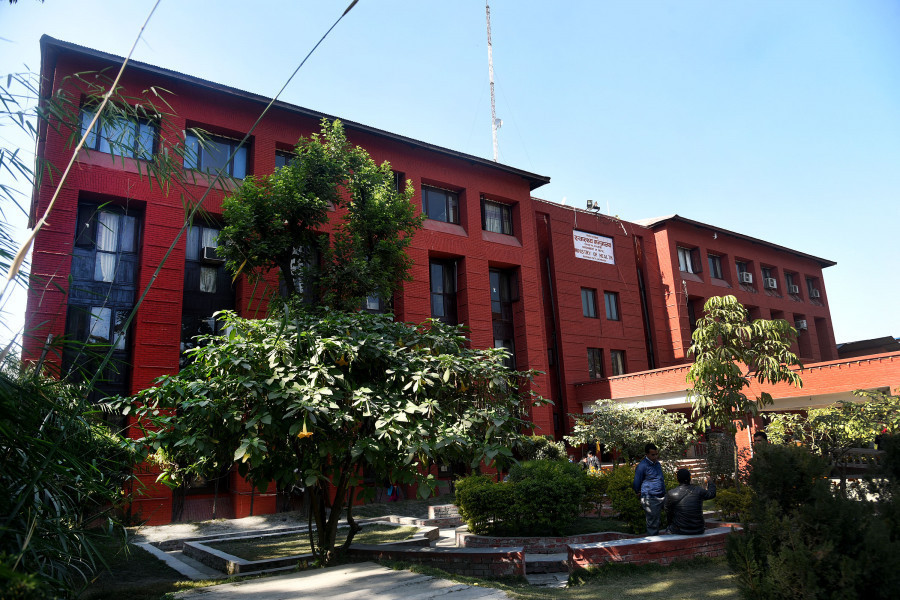Health
Even amid pandemic, government transfers dozen experts
They ask, When the prime minister believes he knows everything, what can experts do?
Arjun Poudel
Dr Basudev Pandey took charge as director of Bharatpur Hospital in Chitwan on Wednesday. This is the second transfer of the virologist, who was director at the Epidemiology and Disease Control Division until two months ago, in less than a year.
Pandey, who holds a PhD degree in virology from Nagasaki University, Japan, and a post-doctoral degree from Thomas Jefferson University, United States, in vaccinology. This time he has been replaced by a child health expert.
“The Ministry of Health and Population doesn’t have anyone else with a better degree in virology than Pandey,” an official at the Health Ministry told the Post. “The government did not want to use his expertise.”
Pandey, who has been in government service for 38 years, is one of the many experts not getting to work in their area of expertise, even amidst a global pandemic.
Around a dozen experts and experienced staffers under the Health Ministry have been transferred to the Health Ministry under an indefinite deputation. Among them, some have retired, some quit after getting frustrated, and others continue to go to the ministry every day just to register their attendance.
“I chose to quit my job after the ministry didn’t give me any work,” Dr Ramesh Kharel, former director at the Management Division under the Department of Health Services, told the Post. “I had a few months left in my term, but was compelled to quit.”
Bhogendra Dotel, former director at the Management Division, too quit his job after he was not given any work for a long time. Dr Radhika Thapaliya, the only risk communication expert at ministry, has not been assigned work as per her expertise ever since she joined the service. The ministry hasn’t even bothered to prepare a risk communication strategy a year into the coronavirus pandemic, which already killed 2,055 and infected 273,070 people throughout the country.
“Why would the government need experts and their expertise when the Prime Minister knows everything?” Dr Govinda Ojha, former director-general at the Department of Health Services, told the Post. “This is very unfortunate that experts are placed under indefinite deputation and are forced to resign or go abroad for work.”
Pandey, the former director at the Epidemiology and Disease Control Division, will retires in two months. But he wasn’t given any responsibility for over a month after being transferred from the Epidemiology and Disease Control Division.
“I have been offered a job in Japan and the United States,” said Pandey. “Though my age does not allow me to work abroad, I will have to go for a few years.”
Pandey, who identified the presence of the dengue virus in Nepal in 2004, worked at the division during the time of the spread of the Ebola virus in Africa and served as director at the Sukraraj Tropical and Infectious DiseaseHospital , was transferred after Hridyesh Triphari became health minister.
“Dr Anthony Fauci, who was lead members of the Trump administration’s White House Coronavirus Task Force become the chief medical adviser to President Joe Biden, but experts here get expelled after the minister changes,” Dr Baburam Marasini, former director at the Epidemiology and Disease Control Division, told the Post. “In our country, experts are penalised, harassed, and ignored. Keeping experienced staff under indefinite deputation is kind of punishment.”
And this is not the first time that the experts have been transferred.
Last year too, Dr Bibek Kumar Lal, then director at the Epidemiology and Disease Control Division was transferred to the SAARC TB and HIV/AIDS Centre. “I had not been able to give sufficient time to my family since I studied MBBS,” Lal told the Post. “During the pandemic, the government gave me rest and did not think it was necessary to use my experience.”
The phrase “balcony division” is popular at the Health Ministry and those on indefinite deputation are said to be working there. They go to the ministry for attendance, sit for some time on the balcony hoping if someone assigned them something and return home.
“They do not need experts and their expertise,” an official at the Department of Health Services, told the Post. “What they need is their people, who can generate money for them. Zero tolerance against corruption is just a saying, you understand the rest.”
The government has not only humiliated experts by not giving them work or transferring them to unrelated workstations, but also by not listening to what they have to say.
In this time of the pandemic, experts who have been to Baluwatar have often said that Prime Minister KP Sharma Oli acts as if he is listening, but suggestions are hardly ever followed. If anyone is outspoken, the person is often barred from giving suggestions.
A group of experts with degrees from top universities from the US and Australia and have experience working on epidemics had complained that they tried to meet the prime minister for months but to no avail.
Doctors say the public health system of a country is not just about infrastructure, it also concerns human resources—experienced doctors, public health specialists, laboratory technicians, information analysts, and competent managers. Transferring experts overseeing the Covid-19 response even as the outbreak continues to ravage the world is counterproductive and dangerous, say public health experts.




 16.12°C Kathmandu
16.12°C Kathmandu















